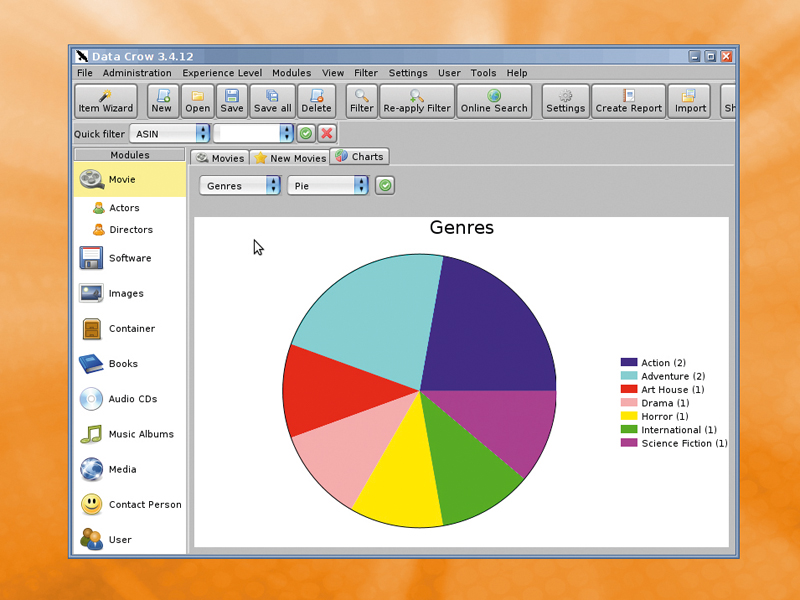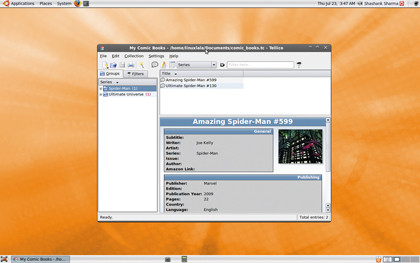5 of the best collection managers for Linux
Apps to keep track of your DVDs, music and all your other stuff

Collecting things is human nature. The things we collect change over time, but the process never stops. It was cuts and bruises when you were seven, cards when you were a teen and, although no one will admit it, those sweet wrappers with the free tattoos made an appearance somewhere too.
So, a moment of thought will likely conjure up a few collections that are still growing under your tender care. Whether it's books, movies, coins, cards, wine, or souvenirs from the fancy restaurants you've been in, you've probably got plenty of stuff but no structured record of it.
That's where collection mangers come in. These days, most are equipped with a slick GUI that can pull information from the internet to help you with cataloguing your collection. Moreover, they'll often enable you to tag the items in your collections, search through your stuff and even export the information to another system.
While you're not exactly spoilt for choice, the tools available are split into two different camps. There are expansive managers with veritable hordes of built-in templates and support for various types of collections, and their lightweight counterparts, which enable you to control the data fields that are associated with each different collection you enter.
However, a slick graphical interface doesn't automatically make these programs any more efficient than a classic leather-bound ledger or a modern man's text editor. So which, if any, of these data collation apps can you trust with your collection of precious treasures? And what do they provide that a paper record can't?
Tellico - this old timer still has what it takes
Written for KDE, but just as at home on your Gnome box, Tellico is perhaps the oldest collection manager that's still going strong today.
Sign up for breaking news, reviews, opinion, top tech deals, and more.
It comes with built-in support for many different types of collections, such as books, movies, music, video games, comic books, coins, stamps, trading cards, wines, board games and more.
Yet instead of using databases to store all this data, Tellico relies on the XML format. Tellico's website provides a detailed illustrated guide in addition to the extensive documentation, but the drawback to having extensive built-in support is the in-your-face interface that comes with it, although this is more than offset by the program's features.

When filing our comic book collections, we honestly don't want to enter the date we purchased the book, so we find it irritating that Tellico expects us to. Even though you don't have to fill in all, or even most, of the fields, the result is unappealing.
The dialog boxes you use to fill in the information for an item are crowded, but there are also all the ugly empty spaces from fields you didn't fill in. Fortunately, then, despite this dodgy start point, you can control what fields are associated with each of the built-in collections.
You can also change the parameters for existing fields. For instance, if you don't want a Purchase Date field for any of the collections, you can individually edit them and delete that field. Alternatively, you can add a new field to any of the templates if you notice something missing, such as a text box to write about the emotional value attached to an item.
Monitor loans
Tellico is also an effective way to keep tabs on your items, since it can record whether you've loaned an item in a collection to someone. You can quickly generate reports about item data too, which can then be printed or exported to HTML if you like, and there are various templates for the reports, including a Loan view.
Finally, Tellico supports many different internet sources that you can use to retrieve information about an item in your collection. These include IMDB; ISBNdb (an online book database); CrossRef for academic articles and bibliographic texts; and the SRU servers, which many libraries use to provide access to their data catalogue. As a bonus, external scripts can be used to search for data on other information sources.
Apart from a simple search, you can create filters based on any of the fields for the collection. Once saved, these filters can then be used to list all items in a collection with a few mouse clicks.
Verdict
Version: 1.3.5
Website: www.periapsis.org/tellico
Price: Free under GPL
The design makes adding data simple and the templates are editable, but the interface could look better.
Rating: 8/10

Shashank Sharma is a trial lawyer in Delhi, India. Long before his foray into the world of litigation, he started his career by writing about Linux and open source software. Over the years, Shashank has also written various articles and reviews for TechRadar Pro, covering web hosting providers and website builder tools.